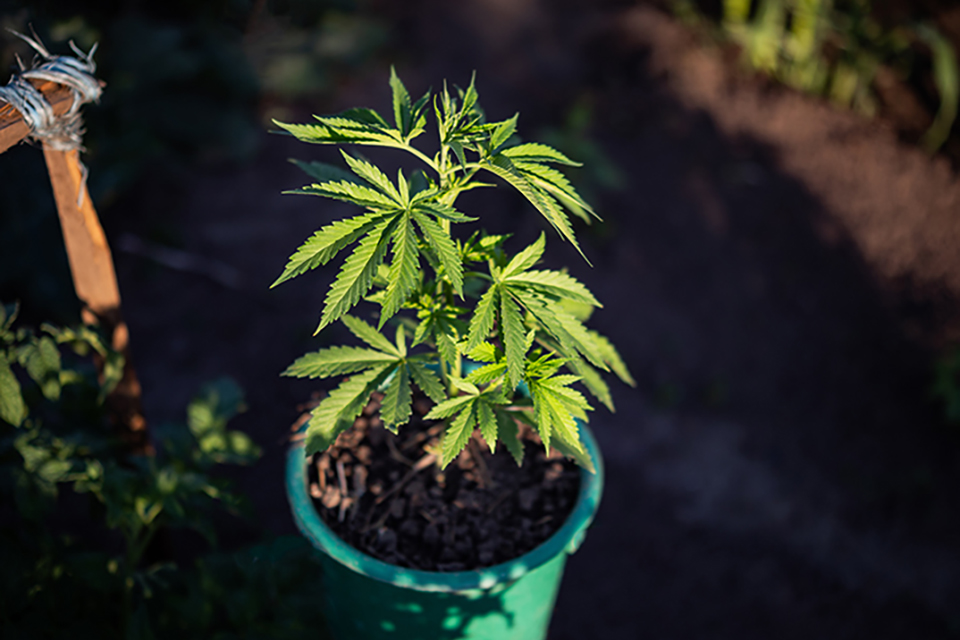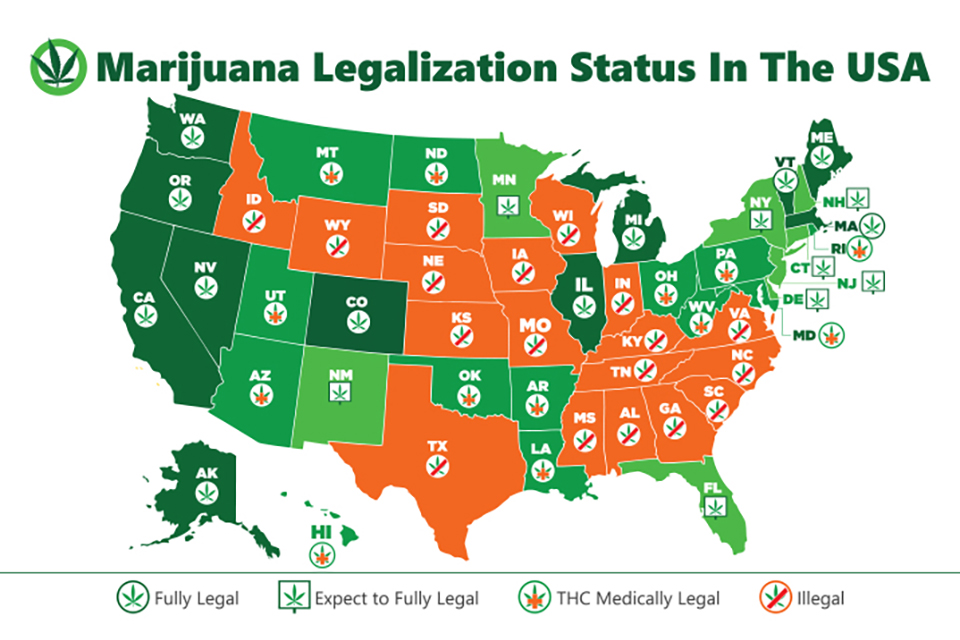
In the evolving landscape of cannabis legalization, the United States is grappling with the implications of this shift on workplace drug testing policies. As of now, cannabis is legal for medical use in 37 states and for recreational use in 24 states. The federal government has recommended reclassifying cannabis from Schedule I to Schedule III under the Controlled Substances Act, which could further complicate employer drug testing policies.
The patchwork of state and federal laws has led to confusion and challenges for employers trying to maintain a safe and productive work environment while respecting employees’ rights. Some employers have scaled back pre-employment cannabis testing, focusing instead on on-the-job impairment and post-accident drug testing, as well as random tests when there’s reasonable suspicion of drug use. Others are moving away from pre-employment screening for jobs that aren’t safety-sensitive.
However, the issue of testing for cannabis remains contentious. While some argue that testing for cannabis is essential for maintaining workplace safety and productivity, others contend that it unfairly penalizes employees for off-duty use, given that cannabis can linger in the system for weeks after use. Furthermore, the reliability of current drug testing methods in detecting active impairment from cannabis has been questioned.
The future of workplace drug testing in the era of cannabis legalization remains uncertain. As more states consider legalization and the federal government reevaluates its classification, employers will need to stay informed and adapt their policies accordingly. The challenge will be to balance the need for workplace safety and productivity with respect for employees’ rights and changing societal attitudes towards cannabis.
Are workplaces relaxing their drug testing policies to allow for legal consumption during off hours? Are they rewriting the rules for potential employees? Will they implement different guidelines for safety-sensitive and customer-facing positions? Or will they create uniform policies for fear of discrimination lawsuits? The answers to those questions have yet to come.
How Marijuana Legislation Has Evolved
In the past 20 years, cannabis legalization has made national headlines. During the 1990s, only a handful of states and Washington DC had laws on medicinal marijuana use. The number gradually rose at the beginning of the 21st century, yet legal use by adults was still a foreign concept.
Fast forward to 2012, when Colorado’s voters passed Amendment 64, which allowed the recreational use of cannabis. Most legalization activities have come via referendum, but Vermont was the first state to legislatively legalize cannabis. Other states, including New Jersey and New York, have followed suit.
During the same time, the number of states with medical marijuana laws has risen. While the federal government still considers it to be a Schedule I drug under the Controlled Substances Act, it has taken a state-focused approach to the regulation of the industry that has arisen because of legislative changes. Some lawmakers have introduced bills supporting the industry or calling for nationwide legalization, which may bring more cannabis into the workplace.
Employer Drug Testing and Legal Marijuana
These policy shifts have left employers in a difficult position. Many workplaces still have zero tolerance policies on using drugs, including cannabis, in and around the workplace—and they don’t want workers clocking in while they’re high. Marijuana’s legality isn’t the issue; after all, a person can be fired for drinking on the job, although alcohol is legal.
However, finding out if applicants and employees are smoking on or off the clock is a challenge. Impairment due to cannabis use is harder to test for and detect than that related to alcohol consumption, and it’s almost impossible for an employer to determine if a positive marijuana test is the result of usage during working or non-working hours. That’s why many employers have simplified things by implementing outright bans. In some instances, though, state laws have made workplace drug testing policies more complex.
Drug Testing Isn’t Always Done Legally
If an employee is fired over a failed drug test, they should ask whether the test was done legally. Except for federal government employers and those receiving federal funds, there are no regulations on private employers’ drug testing. However, some states have enacted laws on how and when employers can require drug tests.
Many companies screen for drug use, including that of marijuana, as part of the hiring process. State laws typically allow employers to test applicants, but the rules on testing of current employees are more restrictive. Some states allow random testing, but others only allow it when:
- There’s a reasonable suspicion that someone is intoxicated on the job
- The worker holds a safety-focused position
- An employee causes or is involved in an accident leading to property damage or personal injury
- It is part of a medical or fitness-for-duty examination
- An employee has completed a drug rehab program
Most states also regulate the ways these tests are performed. For example, Florida and Rhode Island require employers to give workers copies of the test results and a chance to challenge positive ones, either by justifying the results or asking for a retest.
Medical vs. Recreational or Adult Use Cannabis
There’s a big difference between adult use cannabis—a recreational activity—and medicinal marijuana, which is prescribed to patients who use it as a treatment for various conditions. Some states have brought that difference into offices and factories, and it greatly affects workplace drug testing policies.
It’s important for employers to understand their responsibilities and rights where workplace drug testing is concerned. Unfortunately, cannabis is still federally illegal, which means employers can still implement zero tolerance policies on its use. It’s equally vital for business owners to know whether any of their employers are MMJ (medical marijuana) patients and if state laws protect their on-the-job usage or shield them from the results of a failed drug test.
Companies must walk a fine line when disciplining MMJ patients. Several states have enacted laws protecting patients from workplace discrimination. Employers can still mandate drug testing before and during employment, as long as medicinal users aren’t singled out.
Further complicating the matter is the all-important question of worker morale. Many of today’s employees believe that off-the-clock, legal cannabis usage shouldn’t be grounds for termination in the event of a failed drug test. Employers should consider workers’ attitudes when taking disciplinary action and making decisions related to workplace drug testing.
Employer Responses
How are companies responding to changing perceptions and laws? Some employers are retaining their zero tolerance policies, even for off-hours consumption, while others are taking a more relaxed approach and only disciplining workers for failed tests if their productivity has been affected. And, a few places allow employees to consume cannabis on the job.
Do Zero Tolerance Policies Still Make Sense?
According to industry experts, the continuing federal prohibition of marijuana has forced many employers to keep strict policies in place, even for medicinal users. It’s common for employers to bend the rules for MMJ patients, but it’s not guaranteed. Hopefully, changing laws and public perceptions will encourage more employers to take relaxed stances on cannabis consumption.
Policy Enforcement and Job Performance: They Go Hand In Hand
In some workplaces, employees are permitted (and even encouraged) to take periodic smoke breaks, especially if they increase creative thought. However, other employers are concerned about the effects of cannabis consumption on productivity, so they enforce these policies accordingly.
Against the backdrop of medicinal and recreational cannabis legalization, companies are still terminating employees for performance issues related to on-the-job consumption of flower and concentrates. Where MMJ patients are concerned, employers should consult their attorneys to determine the safest approach.
How Cannabis Consumption Affects Job Safety
The buzz on cannabis in the workplace takes a different tone in industries with a greater risk of on-the-job injuries. According to a recent study from the Journal of Occupational and Environmental Medicine, there’s a correlation between marijuana use and work accidents. The risks increase for those who drive for a living—especially people working in public transit—as multiple studies have established links between cannabis intoxication and inhibited driving ability.
The real and perceived risks of cannabis consumption have shaped several states’ workers’ compensation laws. For instance, Wisconsin allows employers to reduce a worker’s benefits by up to 15% if they’re hurt on the job while intoxicated. In Michigan, a worker who is hurt while under the influence of cannabis won’t be covered at all.
Though workplace consumption is a concern in safety-sensitive jobs, it might prevent workers’ compensation claims in other areas. States with MMJ laws saw a significant decrease in claims, which may be because medical cannabis treats many of the same symptoms and conditions addressed by workers’ compensation benefits.
Can Companies Safely Allow Onsite Consumption by Employees?
Is employee consumption safe in some industries? Many employers believe that it’s helpful to allow workers to smoke on the job. In Colorado, where recreational marijuana is legal, there are places that don’t sell cannabis—but allow its on-site consumption by visitors and employees. These employers often notice that, when they hire workers who don’t partake, visitors wonder why. Furthermore, they have also noted that on-the-job cannabis consumption doesn’t seem to affect employee productivity.
For these employers, workers’ consumption is seen as a brand-building exercise that helps establish a warm and welcoming environment for guests. However, it’s not right for every company, especially those that aren’t in the cannabis industry.
Changing the Rules: A Matter of Trial and Error
America is sometimes known as the factory in which democracy is built, and we’ve seen a great deal of experimentation as states build on and learn from previous experiences. As the legalization of marijuana becomes more widespread and normalized, companies will continue to try approaches that suit their culture, branding, and industry.
As with other on-the-job rules, there’s no universal answer. Every company is different, and the right approach is the one that ensures employee safety, productivity, and morale. As the debate moves from individual states to the Capitol, workplace cannabis policies are something more companies will need to think about.
Grow a Legal Crop
Whether you’re a recreational or medicinal marijuana user, the best crops start with the highest quality seeds. At kindseed.com, you’ll find one of the biggest online selections of cannabis seeds. We offer autoflowering seeds, which flower quickly. For a euphoric high, consider our high-THC varieties. And, for greater relaxation without the buzz, try our CBD seeds. We’re here to help you find the right seeds for a great crop!



